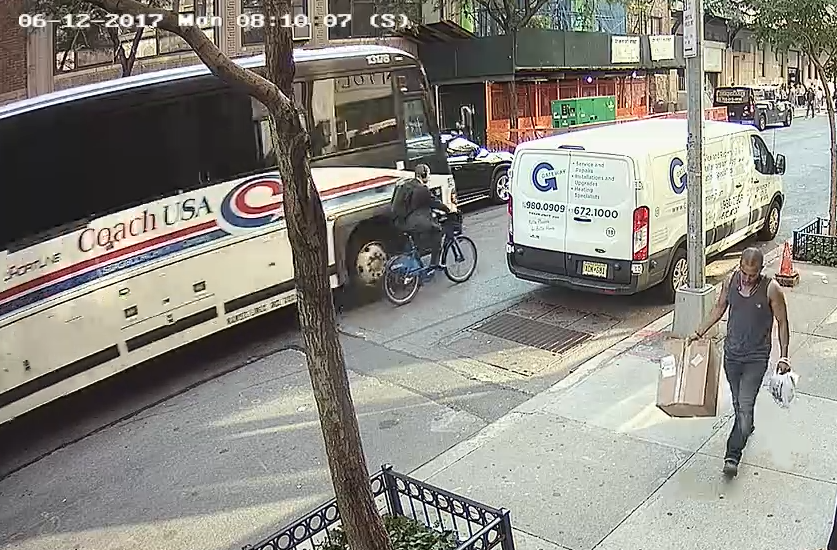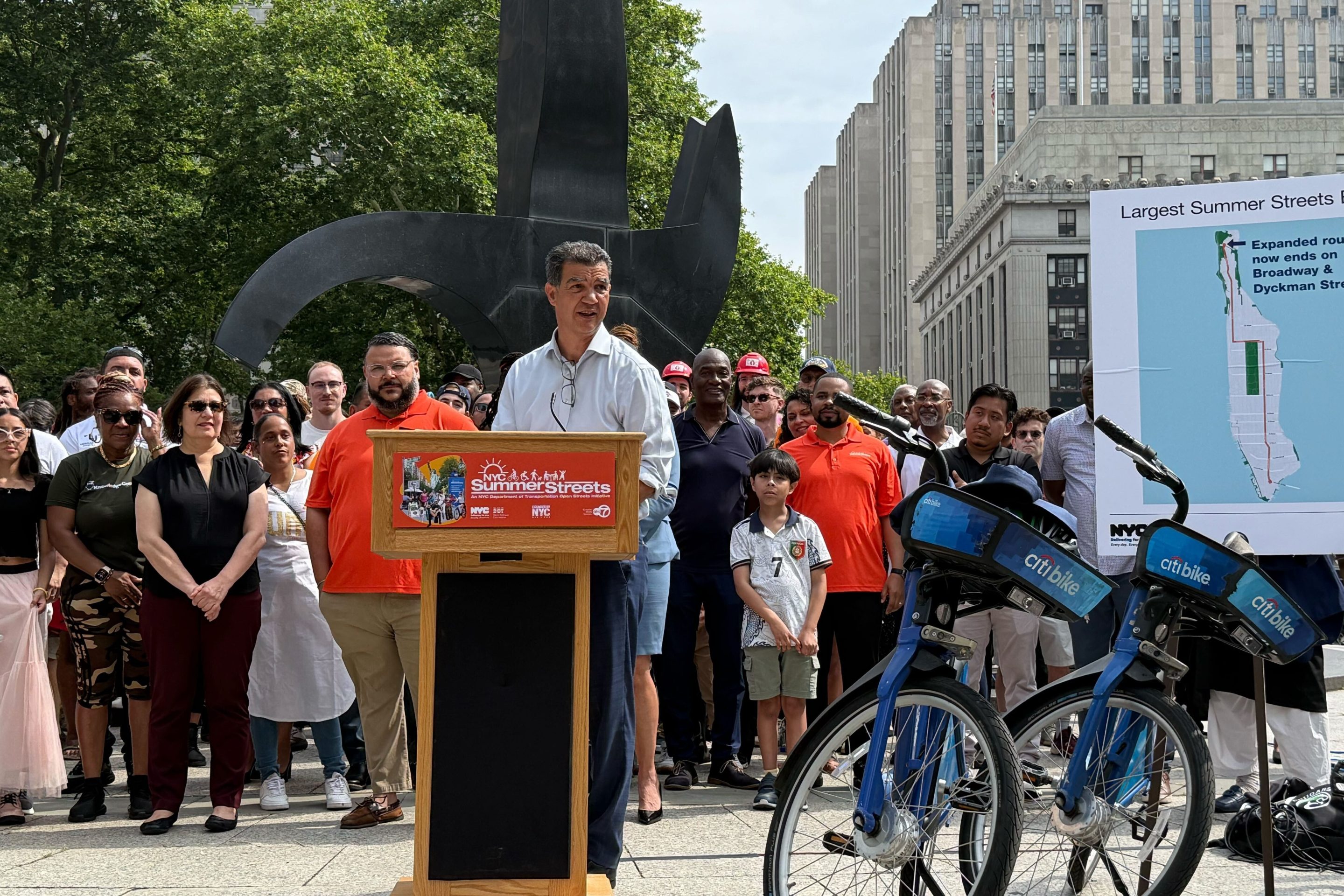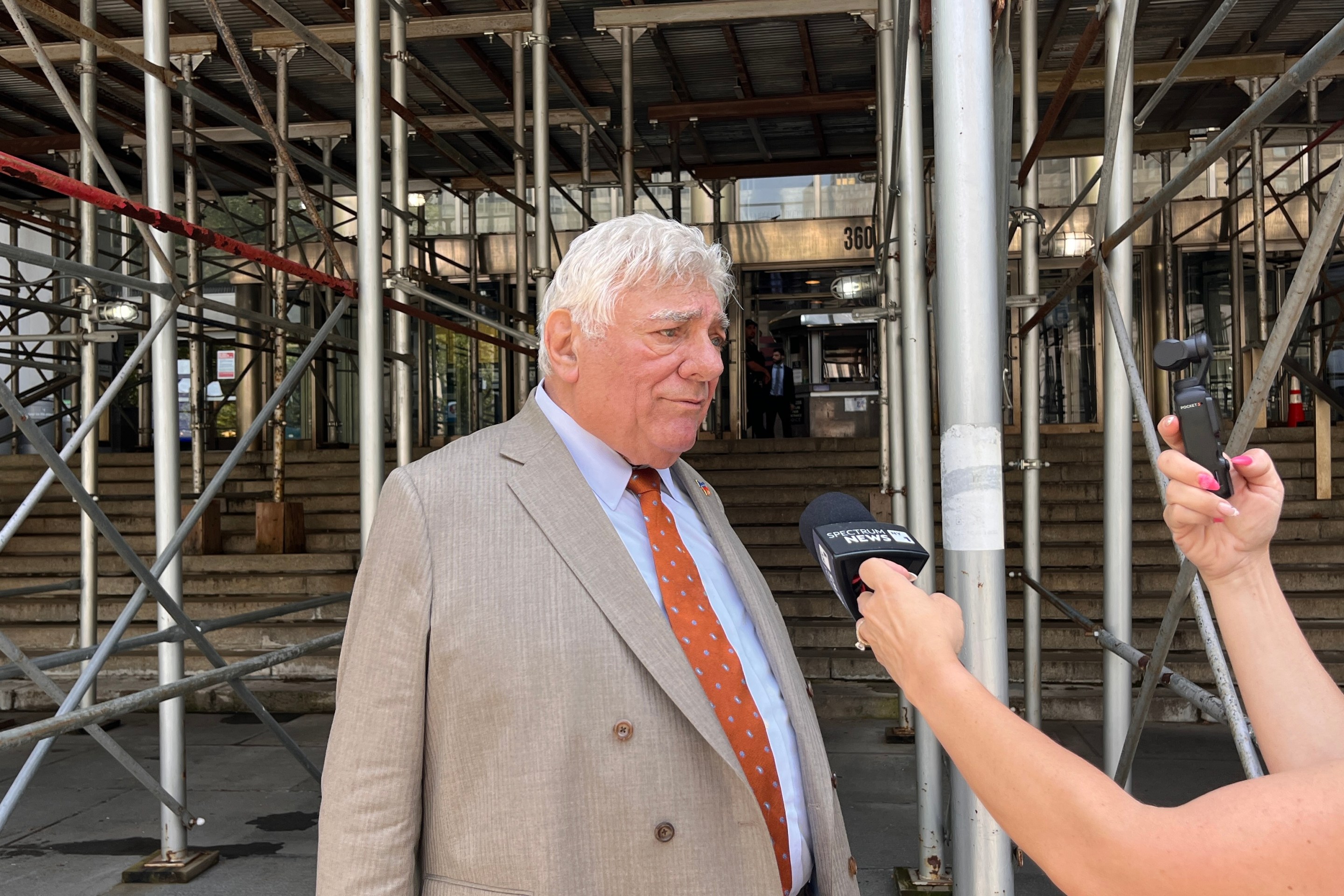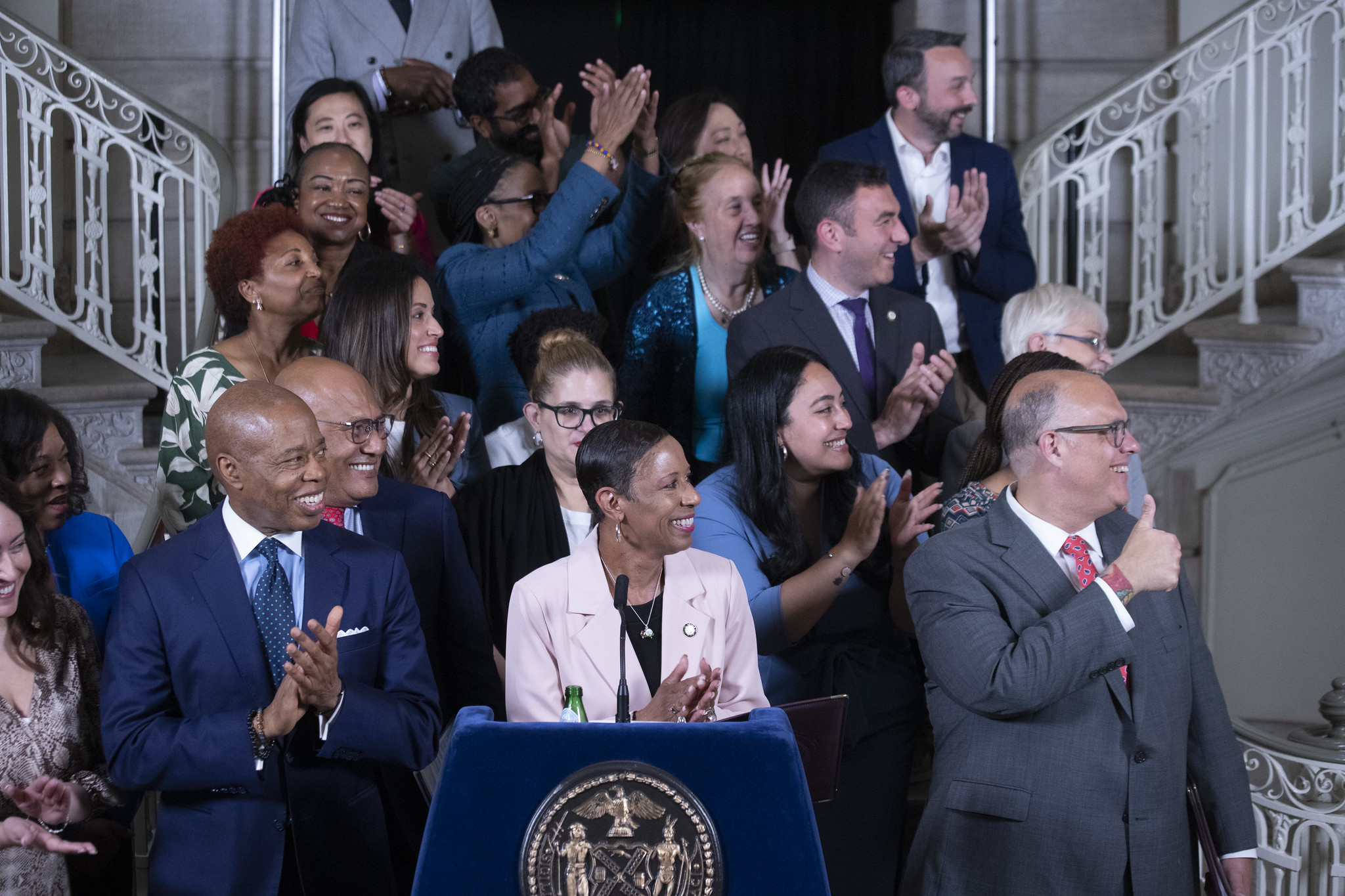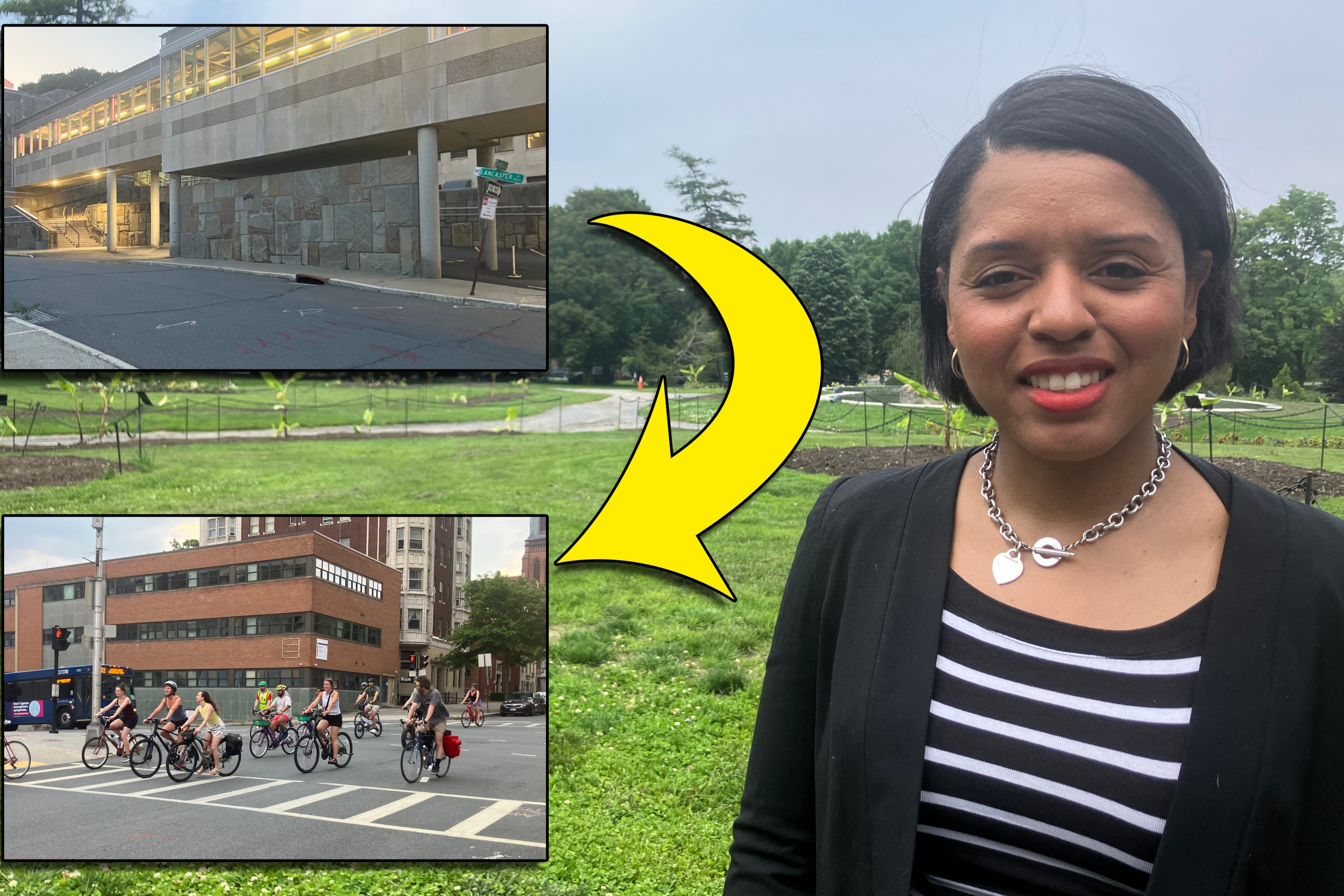
Manhattan district attorney hopeful Liz Crotty — a self-described “centrist” candidate in an eight-person race heavy with liberals — took issue with a Streetsblog article that recounted some of her comments at a recent candidate forum. In her remarks, Crotty lambasted the 2014 “Right of Way” Law, under which one of her firm’s clients, bus driver Dave Lewis, was criminally convicted for running down and killing a cyclist, Dan Hanegby, in Manhattan in 2017. Crotty described such fatal crashes as “accidents.” Further, she contended that the Right of Way Law is unfair because it does not require proof of a criminal intent (“mens rea,” in legal parlance) by a driver before assigning a criminal penalty. Indeed, Lewis is appealing his conviction in hopes of having the law overturned as unconstitutional for that reason.
The safe-streets movement has championed the Right of Way Law as a necessary deterrent to the thoughtless, horrendous driving that has killed so many pedestrians and cyclists. It sees the law as a bridge between the ineffective civil summonses issued for sober, negligent driving that kills and much more serious charges, such as manslaughter, which prosecutors have difficulty bringing because they must prove that a driver intended to cause, or at least disregarded the risk of, death. Moreover, courts deem constitutional many laws that provide criminal penalties for conduct without seeking to establish intent.
The street safety movement almost universally supports the Right of Way Law. But because Crotty is a leading candidate to be the next Manhattan DA — a top American law-enforcement post, and a signal office for the cause of street safety — we believe it is important to give her space to explain her views without any journalistic filter or editing. That said, we are also publishing today an opposing view by a rival DA candidate, Assembly Member Dan Quart (click here to read that piece).
Few, if any, experiences in life are more tragic than an unexpected loss of a loved one in a vehicular accident. The pain and devastation are immeasurable. It's natural to want to help families of victims to get answers and a semblance of closure.
Yet, even as the grief may be harrowing, many vehicular accidents, even those in which the driver has culpability, are just that — accidents. A death or devastating injury should not dictate whether our legal system treats a driver in such an accident as a criminal but rather the standard of proof of what the driver was doing at the time of the accident and whether or not the driver was criminally negligent.
In many, if not most, such cases, a judge and jury in our civil courts are the appropriate arbiters, rather than a district attorney. That's because, before a district attorney wields the power to charge, convict, incarcerate, and ultimately brand anyone a criminal, the essential elements of criminality must exist — that is, conduct that is knowing, intentional, reckless, or criminally negligent. New York City Administrative Code 19-190, the “Right of Way” law, enacted in 2014 as part of Vision Zero, is no exception.
Vision Zero’s mission is noble: to protect pedestrians on foot and bicycle from injury or death by vehicles on our roadways. Vision Zero's legislative intent of making the city streets safer by reducing accidents is laudable. However, it begs a bigger question: Is it fair to assign criminal liability with a civil standard of proof of strict liability, to be found guilty of a criminal charge?
It doesn't matter if the driver was momentarily distracted by children screaming and fighting in the backseat — a regular part of many single and working parents’ days — because the law does not require that the driver behaved knowingly, intentionally, recklessly, or in a criminally negligent manner. Rather, the collision itself "proves" that the driver is guilty and, therefore, a “criminal.” Moreover, the statute punishes fatal accidents in the exact way that it does those merely involving a “physical injury” in which a person walks or rides away with a bruised arm.
Instead, the City Council, NYPD, and district attorneys should use their respective and existing tools in order to fulfill the statute's objective before indelibly labeling another New Yorker a “criminal.”
For example, the city could:
- add bike paths and expand their widths,
- invest in more speed cameras to make our streets safer,
- ticket speeding drivers and those disregarding traffic laws aggressively and
- reduce speed limits.
“People are intentionally driving over the speed limit. People are intentionally on their phone while on the highway. People are intentionally drinking or taking drugs, then deciding to operate a vehicle. These things are tragic and they're not accidents.” https://t.co/NfszhbLTMy
— Transportation Alternatives *Vote on Sammy's Law* (@TransAlt) November 23, 2020
In fact, Vehicle and Traffic Law 1146, the statute that spawned NYAC 19-190, itself provides a remedy for right-of-way collisions. Instead of 30 days in jail and a criminal record, violators of VTL 1146 may be punished by 15 days in jail, fines, and points on their driver license. If courts wanted to underscore the severity of such offenses, they could hold violators accountable to the maximum allowable penalty. Further, although it may be an unpopular proposition, if the city wanted to prioritize biker safety, it could mandate bike helmets and enforce the prohibition against riding with headphones in both ears, in the same way that it tickets drivers for failing to wear a seatbelt.
The perception that NYAC 19-190 curbs reckless driving is wrong. Reckless endangerment and reckless driving are not routinely prosecuted in conjunction with NYAC 19-190 because those accused under the statute generally are following the rules of the road and not driving recklessly.
In an inaccurately titled article, “Several Manhattan DA Hopefuls Miss Mark on Crisis of Reckless Driving,” Streetsblog quoted a personal-injury lawyer who wrongly claims that certain district attorney candidates don’t understand that the system “fails to address reckless drivers who kill.”
This is @LizCrotty2021's client she's talking about in last night's debate, where she says ~'accidents happen'? https://t.co/iprToaCwJu cc: @amylcohen
— Steve Vaccaro (@BicyclesOnly) December 3, 2020
‘Justice’: Killer of Citi Bike Rider Dan Hanegby is Guilty https://t.co/EOVFRvicRm via @StreetsblogNYC
In fact, the “Right of Way” law wasn't designed to combat reckless driving — because it doesn't require prosecutors to prove recklessness. In practice, that means drivers can drive below the speed limit, use a turning signal, and have both hands on the steering wheel without acting recklessly — and still be deemed a criminal. All that a district attorney must prove, by what amounts to a strict-liability standard, is that the driver failed to yield to a person who had the right of way and failed to exercise due care. Again, should criminal liability be attached without any mens rea, or knowledge of any wrongdoing?
New Yorkers are rallying around bail and discovery reform, efforts to pursue equal justice regardless of race or ethnicity, re-examine mandatory-minimum sentences, and reintegrate offenders into society. Yet too many are willing to discard the pillars of criminal law and affix far worse than a "Scarlet Letter" on some of the same people for whom we advocate. Legislators can enact laws they deem appropriate, but the tenets of criminal justice are not born of political expediency. No matter how desperately we want to make an injured or aggrieved party whole, the ends do not justify the means.
The district attorney, who wields an unparalleled power, must examine other means and enforce existing public-safety laws before branding hard-working New Yorkers as “criminals” and crippling their ability to secure employment, rent an apartment, or simply provide for their families.
Criminal-defense lawyer Liz Crotty (@LizCrotty2021) is running to be Manhattan district attorney. Transportation Alternatives said of Crotty's views, "the lethal culture of reckless driving is kept alive when leaders and elected officials make excuses for such inexcusable acts."
